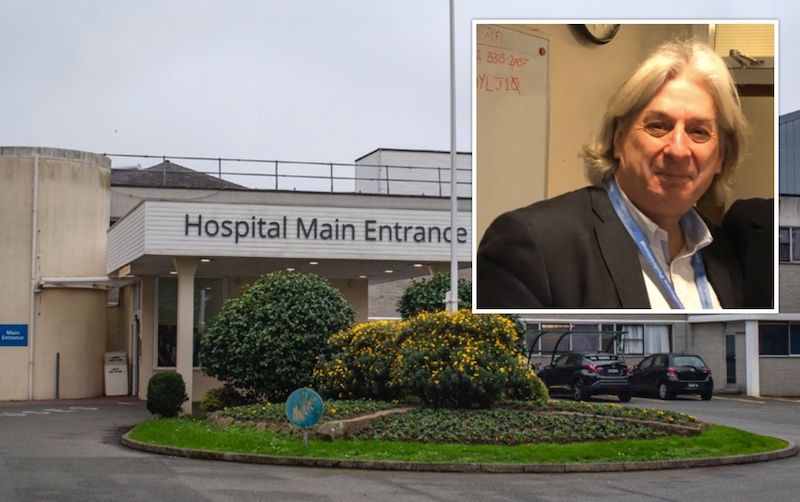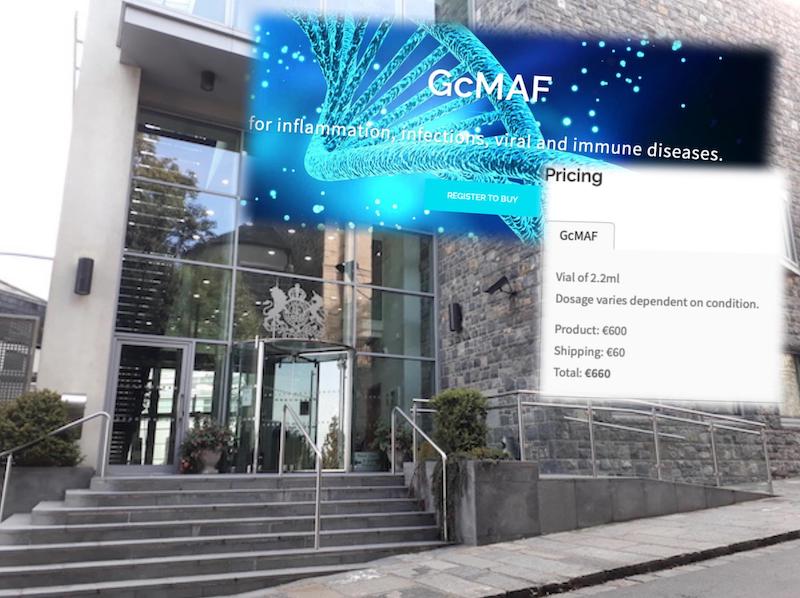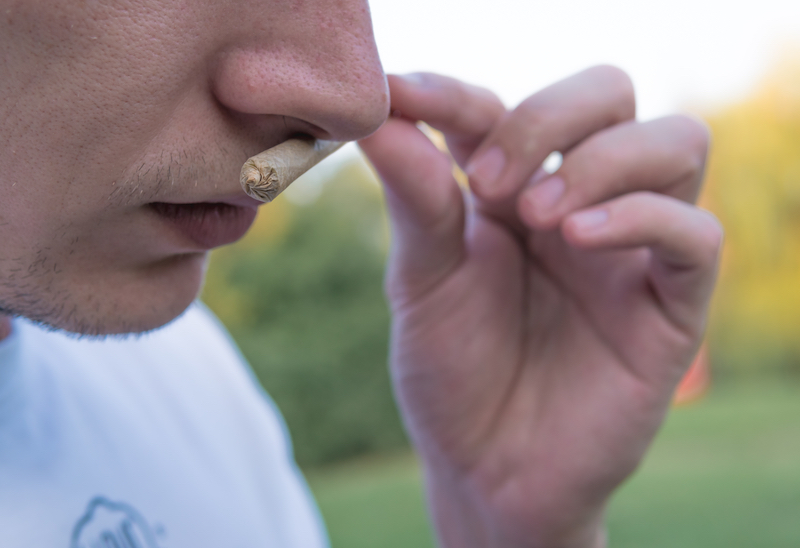


A number of controversial decisions were made during his 25-years service as Guernsey's Chief Pharmacist but, as Ed Freestone told Express, it was the people he worked with who ensured his final days working for the States were among his personal highlights.
Mr Freestone has now finished work and has handed over as many of his former responsibilities as he could while reminiscing with the media about the many changes he has seen in health care during those years.
Some people may remember him for the decision to ban the so-called 'legal highs' or the efforts in stopping the production and sale of GcMaf, but he has also been instrumental in a move towards alternative therapies and increased resources for mental health services.
2/2 We also said goodbye to Chief Pharmacist Ed Freestone who has done so much over the years for Health and Social Care. We gave him a Licence for the Retirement of a Chief Pharmacist - with no expiry date! pic.twitter.com/b1aG1YbO12
— Heidi Soulsby (@HeidiSoulsby) December 18, 2019
Above: Health and Social Care President, Deputy Heidi Soulsby, bid Mr Freestone farewell during an informal ceremony ahead of his retirement.
Mr Freestone started work in Guernsey in 1995 and says the role has changed quite a lot in that time.
"We've passed legislation to regulate our medicines market so the role now has that built into it. It's become much more 'across States working' in the way it has to operate because we have to work with Law Enforcement, and we need to work with our colleagues in environmental health and pollution regulation and stuff like that, so we've become a much more pan-organisation because many of the things we're dealing with, other people have roles and responsibilities within that. So it's become much wider than the hospital which is where it started."
The Chief Pharmacist is responsible for ensuring all medicines that are put on the market in Guernsey have achieved the standard that is required.
"The standard that is required is that they have marketing authorisation issued by the United Kingdom," said Mr Freestone. "That means all our medicines meet the stringent tests which are applied to any medicine which you would buy in the UK. The result of that is that the public can be assured that whilst things don't always go according to plan, 99.99% of the time it does, and the medicines they take are of a fit and proper purpose.
"If you buy medicine over the internet you are taking a hell of a risk as you don't know anything about it. Whereas if you go into your community pharmacy or your supermarket, and buy your paracetamol you know it's been through a proper process."

Pictured: The internet brought many challenges with it when it came to regulating medicines.
One of the biggest changes affecting medicines since 1995 has been the advance of the internet.
Mr Freestone would urge people against buying medicines they need online, because there is no way of knowing what you're actually getting.
"You can buy anything you want, or at least you can believe you're buying anything you want. The chances of you actually getting what you thought you bought is about one in four, or worse.
"Some analysis of sildenafil imports into the UK carried out by the Pharmaceutical Society a while ago as a research project, found that I think only about one in four contained sildenafil on their own at roughly the strength that was specified on the tin. The rest were mixtures of other agents similar, to nothing, so you really are taking a risk.
"But if you buy paracetamol in town, and it says 500mg, that is what you're getting."
Earlier this decade so-called 'legal highs' became very easy to buy in Guernsey, for recreational use. The law was changed in 2014 to ban the importation of the substances.
Mr Freestone said the affected laws were changed in subtle ways, to bring the island into line with the UK.
"Our law is subtly different to the UK, and we use the Medicines Law so people who can commercially import are restrict to the people who have a legitimate business to be doing that, so you can't import prescription only medicines into Guernsey in commercial quantities unless you are a pharmacist, doctor, vet, dentist or the hospital, and that's it."
The law was changed to stop shops bringing the products in.
"Yes, all that stopped. We got the controls in place using definitions which are in the medicines law and we brought the whole thing under control and brought the whole thing to a grinding halt, without having to do too much. We were very clear in what we were aiming to achieve which is not preventing legitimate businesses from working, but to prevent people importing the drugs some people were abusing. Basically, they were all prescription only medicines so that was fairly straight forward."

Pictured: The situation surrounding GcMAF has been widely reported.
A decision which attracted some criticism in recent years was the change in the law to ban the production and import of a substance known as GcMAF which had been developed by David Noakes, a businessman who used to live in Guernsey but is now believed to be 'on the run' after being released from prison in the UK.
The decision in early 2015 to ban the substance resulted in campaigning by those who had been taking it and still claim in some cases that it had saved theirs or their loved ones lives.
Mr Freestone is adamant the right decision was made when the States banned it though.
"The medicines law we brought in in 2008 meant that we were in control of our local market. Prior to that date I don't think we could have done anything.
"So, we were faced with the challenge of an unlicensed medicine being marketed from our island. It was a breach of protocol three regulations which is how we trade with the UK, until after Brexit. It was a massive learning curve for everyone because we had never done one of these. I'd never done one before, I'd never been involved in such an investigation, so we were having to work with Law Enforcement about how you tag stuff for evidence. It was all new. Working with the MHRA in the UK and also we worked with the French and the Dutch and the Belgian, and Austria, Switzerland and Germany so we were working with multi-national agencies but of course the head office was here, even if none of the stuff was here so it was quite complicated.
"We were given assurances by the people involved, that it met all the standards that were required under the law. Eventually with our colleagues in the UK, they went and inspected the site and discovered that the raw material was plasma which was obtained from prisoners in the United States and it very specifically said 'not for use to treat humans'.
"So what do you do? Blood products are some of the most risky things to use and it said on the delivery notes 'not for use to treat humans'."
Next month, after Mr Freestone has retired, the States of Guernsey will be deciding whether or not to spend millions of pounds on a number of medicines not previously available in Guernsey.
That sounds like a 'win-win' for the health services in winning public favour. Giving patients access to medicines they might not have previously been able to take, opening up new lines of health care in the island.
But, Mr Freestone urges caution, because everything really does come down to money.
"The question really for us as a community, and the debate is going to be very difficult, is we have many things we can't do, medicines is just one of them. So if we spend the money over there, that means someone over here isn't going to get something that they think is equally as important.
"The trick is going to be for us as a community to work out how we wish to use the resources we have available to deliver health care and that is a political decision not a technical one. All I can do is advise, and my advice is this:
"You can only spend your pound once. So if we spend it on medicines and that is a perfectly legitimate choice then we can't then spend that money on talking therapies, or community psychiatric teams, or community nursing, and we have the huge challenge of the demography of our community and people want to stay in their homes and that requires more support and care in the community.
"We're going to have to make choices and that is going to be hard for the community. It's easy to say yes, it's much harder to say no."
Express frequently reports on court cases where individuals are imprisoned for possessing, importing, growing or supplying cannabis or associated products. There seems to be a tidal wave of opinions changing on the legality of the substance though, and with 'cannabis farms' in the planning in Guernsey and Alderney, Mr Freestone says the Bailiwick may need to look to experts from elsewhere for help as the situation changes.

Pictured: There are many people clamouring for further changes in the law on cannabis and related products. Mr Freestone says expert help will be needed as those conversations continue.
"The law has been changed. CBD itself has never been a regulated product, but THC is. And the law was binary. We have decided and we have legislated to say that there is a trace contamination up to a certain limit that we will accept to being incidental to the CBD. So it's not that we've licensed THC, it's that we've licensed CBD with a trace of THC, and that has made it possible for people to think about the growing industry.
"We've done a lot of work this year to get that into a regulatory framework and we recently published our updated guidance which is quite complex. But you have to realise, there are some risks to us as a community reputational and otherwise, but also potentially people can make products and market it and sell it and it's all perfectly legal - that's fine.
"Other people are now more interested in higher THC products to get into the medicinal market, which is another game altogether. It's a much more regulated market, much more complex, but also carrying much more risks so we will have to step into that market with care. That's going to be a job for my successor, it will need expertise from outside the island. We do not have the expertise on island at all, and we will have to work with the UK's regulatory agencies, it's just the way it's going to have to be.
As Chief Pharmacist, Mr Freestone has been involved in all aspects of healthcare and the development of services over the past two and a half decades. He says it is never just about medicines.
"I've been involved in what's called commissioning which is about looking at service developments being put through the system, often either on-island or off-island medicines, and I've been involved in that debate because often they have got medicines in them, and I have got that expertise, but actually it's about developing commissioning policies so that we do not have what historically we've struggled with a bit, which is somethings doing very well for resources and other areas being a bit 'Cinderella'.
"Equity of care is very much a key part of my philosophy, so it doesn't matter what your age, who you are, what you are, what your problem is, your problem is looked at on the same terms as patient B, as patient C, and you're all treated in the same way so your access to resources that you need, is dealt with on the same basis. I don't think that cancer is more important than mental health, is more important than children, or maternity services.
"Use the same rules for everything and treat everybody the same. And I really passionately believe in making sure that equity is served across the health care system because it's maximising the benefit to the community of the resources we have.
"I'm not sure the community has got this, that we can only spend our pound once and that means if you spend it on that, then you can't spend it on this."
Mr Freestone is confident he is leaving the States with that ethos embedded, having worked to achieve that goal.
Lovely send off given by HSC staff to Chief Pharmacist Ed Freestone on his retirement - together with lookalikes! pic.twitter.com/cP3MXTZpmU
— Heidi Soulsby (@HeidiSoulsby) December 17, 2019
Above: Mr Freestones hairstyle was one of many things his colleagues said they would remember on his retirement.
"A colleague and I did a lot of work around trying to make sure that there were very clear parameters and thinking around how those decisions could be made.
"Now you can change financial parameters quite easily, which is what they'll be talking about doing. But I think some of the structures we've put in place are really important.
"To give you an example, I have never seen a letter asking for treatment for somebody, I've seen them for people called piano players and something like that, but I've seen them for a plumber, so the valuing of skills is quite interesting. Actually, we need to value everything equally."
Pictured top: Ed Freestone.
Comments
Comments on this story express the views of the commentator only, not Bailiwick Publishing. We are unable to guarantee the accuracy of any of those comments.